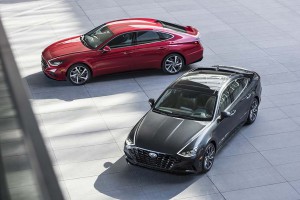
The temperature isn’t the only thing that’s cold this January. New vehicle sales are expected to be down as well.
Analysts at TrueCar are predicting, just like in 2019, sales of new vehicles will get off to a slow start in January.
Meanwhile, a new study from IHS Markit found the growth rate of those households with sedans acquiring sport-utility vehicles is slowing in the U.S. market.
At the same time, loyalty to sedans, while continuing to decline, is declining at a slower rate. From 2016 to 2017, the decline was 3.3 percentage points; and from 2017 to 2018, 4.2 percentage points. In contrast, from 2018 to 2019, the decrease in sedan loyalty was just 1.1 percentage points.
(Hyundai hopes Sonata Super Bowl is “wicked smaht”)
This suggests the shift to trucks and SUVs is beginning to slow, IHS says. TrueCar data and analytics subsidiary, ALG, projects total new vehicle sales will reach 1,099,510 units in January 2020, down 2.9% from a year ago.

Helped by the 2020 Sonata and a slew of new SUVs, Hyundai’s sales are expected to be strong in the first month of 2020.
January’s seasonally adjusted annualized rate (SAAR) for total light vehicle sales is an estimated 16.5 million units. Excluding fleet sales, ALG expects U.S. retail deliveries of new cars and light trucks to be 887,729 units, a decrease of 0.8% from a year ago when sales got off to a slow start but picked up momentum in the second half of the year.
“January is typically a slower month for vehicle sales, but traditional economic indicators such as income growth, unemployment rates and stock market are healthy and positive,” said Eric Lyman, chief industry analyst at ALG, a subsidiary of TrueCar. “A steady economy and high consumer confidence are contributing to steady sales this month with only a slight year-over-year decline.”
Among mainstream brands, Kia and Hyundai are expected to kickoff 2020 on a high note with a strong sales month for both brands. Kia is up 10% and Hyundai is up 15% respectively year-over-year for total sales. In terms of new car shoppers, Kia and Hyundai were the fastest growing brands on the
“Hyundai has shown strong performance in the last 18 months” said Nick Woolard, director of OEM and Affinity Partner Analytics at TrueCar.
(New vehicle buyers want best bang for the buck)
“They’ve introduced new products and broadened their utility portfolio. As a result, we’ve seen an increase in consideration and more consumers cross-shopping Hyundai on the TrueCar platform.”

BMW looks to begin battling for the luxury sales crown from the word go in 2020 with strong results in January.
BMW’s momentum continues as they compete for the luxury sales crown in 2020. This month, the German automaker is expected to be up 11.9% year-over-year in total sales and up 11% on retail sales with incentives up by 2.7%. However, Tesla, which is expected to report sales of more than 21,000 units, is creeping closer to both BMW and Daimler in overall sales volume.
Ford and Nissan are forecasted to be down 11.4% and 24%, respectively, in total unit sales compared to a year ago. Nissan announced it was switching from monthly to quarterly sales reporting.
Ford’s decline is primarily driven by fleet which is expected to be down 24% as well.
Nissan, on the other hand, is facing declining sales from both its mainstream Nissan brand as well as its Infiniti luxury brand. A 40.2% year-over-year decline in fleet sales also contributed to the decline in sales.
(Edmunds analyst bucks trend, predicts 17.1M sales for 2020)
The average automaker’s incentive spending is expected to reach $3,674, down 3%, or $47 dollars, year-over-year, and down 12.7% or $532 from December 2019. Used vehicle sales for January 2020 are expected to reach 3,329,070, up 6% from a year ago and up 12% from December 2019.

“Nissan, on the other hand, is facing declining sales from both its mainstream Nissan brand as well as its Infiniti luxury brand. A 40.2% year-over-year decline in fleet sales also contributed to the decline in sales.”
Nissan isn’t going to report January sales…according to Automotive News, they’ve decided to go quarterly along with Porsche, BMW and the domestics
Waiting for more dominoes